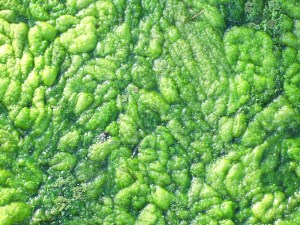
You might know algae as the little green particles that float atop lakes. But did you know that algae is a source of biofuel that can produce four types of oil.
The key to cultivating algae for biofuel is genetically manipulating it to produce more oil. Algae is more efficient than corn, sugarcane, or switchgrass. Some algae species even contain up to 60 percent oil, and genetic engineers say they can boost this percentage even higher.
Algae is sustainable, highly productive, easy to cultivate, and captures carbon dioxide. If oil-intensive algae were cultivated on a broad scale, the kind of scale that is used for other commercial crops, it could eventually replace 70 percent of the oil supply currently used for transportation. This includes jet fuel, gasoline, and diesel fuel.
Algae produces 5,000 gallons of oil per acre. Today, scientists have the capacity produce 300 billion gallons of algae biofuels per year. 460 billion gallons would be needed to replace all of the gasoline Americans consume in one year, however.
Algae tend to produce more oil when there is little nitrogen in their environment; but, without nitrogen, they grow more slowly. Scientists at Sapphire Energy, a San Diego biofuel company, recently discovered a gene that produces high oil yield with nitrogen present. This could potentially be the future of oil.
So far, geneticists have studied only one species of algae,
chlamydomonas reinhardtii
. Yet, thousands of other species are possible sources of biofuel, too. New laws that mandate more eco-friendly sources of energy, are full of confusing regulations. Algae biofuels could be the answer, but they have challenges to overcome before becoming a wide-spread reality.
[Source:
Discover Magazine
]

